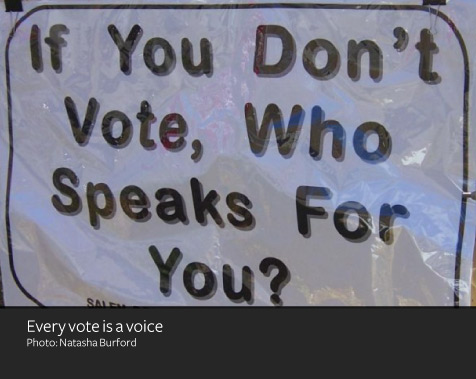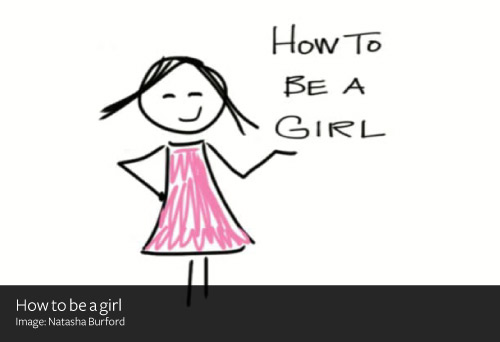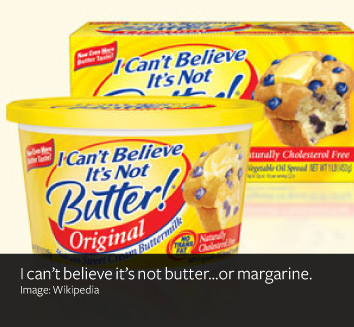It’s written right there on the Liberal’s Real Change website, posted during the 2015 election: “We will make every vote count.”Right before the 2015 election, the Liberals wanted to change our voting system, and they wanted it done ASAP. In fact, they stated they were “committed to ensuring that 2015 will be the last federal election conducted under the first-past-the-post voting system.”This is great news for our democracy.Our current system is called, first-past-the-post voting. In this system, if the candidate you voted for in your riding doesn’t win, your vote is lost. As a result of this, more than half of all votes don’t count in current elections and majority governments are elected with less than 50% of the popular vote.Thanks to our voting system, here are your options when the political party/leader you like best is in third according to polls:
- Rather than vote, stay home because your vote won’t count.
- Vote for the party you like most and accept that your vote won’t count.
- Vote for second best because you don’t want your vote to be wasted…
Option (c) is called “strategic voting” which means you just wait around and watch the polls to figure out what everyone else is doing so you can figure out whom to vote for to block the worse option. Yes, make up your mind based on what you think other people might do. Not very inspiring, is it?In the 2011 federal elections, and for the first time ever, the Liberals were a victim and not a beneficiary of strategic voting. It’s ironic, since Liberals always tell NDP and Green voters to vote strategically to block Conservatives. In the end, the Liberals ended up in third place for the first time ever. And man, were they bitter about it.Thanks to our first-past-the-post system, the Liberals ended up with almost 20% of the votes but only 11% of the seats in parliament. That meant almost half of all Liberal votes were effectively wasted and ignored. Another silly by-product of the election was that Harper got a majority government when 60% of people voted against him. A majority government means that one party has 100% of the power until the next election.So, the Liberals began talking about changing the voting system to make “every vote count”. It only took a historic colossal defeat for the Liberal establishment to finally talk about doing the right thing.Proportional representation makes every vote countLuckily, there is currently a voting system that counts every vote. That system is called proportional representation and it appears in far more countries than our system. In fact, 7 of the top 10 countries as ranked by the Legatum Prosperity Index have a form of proportional representation. Only one country, Canada (ranked 6th), uses first-past-the-post voting.In proportional representation, the percentage of seats a party receives in parliament is proportional to the number of votes they receive across the province or country. That means if your candidate doesn’t win the seat, then your vote still has an effect on the make-up of government. No more wasted votes.In 2011, under proportional representation, the Liberals would have received 20% of the seats because they received 20% of the votes. The Conservatives would have had a minority government with 40% of the seats in parliament. A minority government means politicians have to compromise with other parties in order to table a budget and make things happen. This means that even if the party you wanted loses, they (and therefore you) still have a say on policy.Proportional representation makes every vote count, diminishes the need for strategic voting and only creates majority governments when they are deserved.Will the Liberals improve our democracy or simply help themselves?The results of this past election may in fact be a terrible blow to electoral reform. With a country-wide anti-Harper swing, strategic voting gave the Liberals a majority government (with only 39% of the vote!).We saw that the Liberals became serious about changing the voting system when they thought it could benefit them. Now that our unfair electoral system has benefited them again, will they change it?If they do, my bet is that they will go for preferential/ranked ballot because it is the system they believe will benefit them the most. In this system, you rank your first, second, third, etc. choice when you vote but it does not fix the fact that your first choice will likely get ignored. As such, millions and millions of first place votes will get wasted again. Ranked ballot systems are a terrible choice for creating multi-party democracy and easily create majority government even though the winner gets less than 50% of people’s first choice.The Liberals like this because they believe they are everybody’s second choice and thus ranked ballot will benefit THEM the most.In their platform, the Liberals said they would “convene an all-party Parliamentary committee to review a wide variety of reforms”. Sounds fair, right? They can easily stack the committee with politicians to get the result they want.The real way to make every vote count is proportional representation, a system of government that respect’s people first choice on how they believe their country and province should be run. What the Liberals do on improving our democracy above all will determine if they are serious about real change.
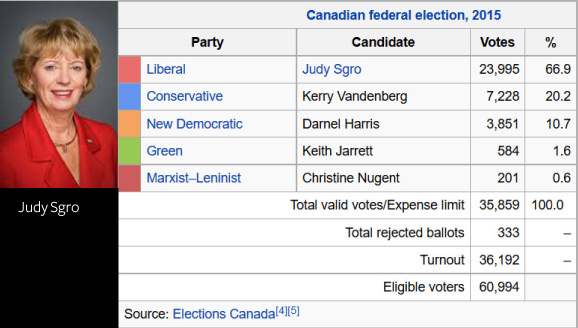 Incumbent Judy Sgro won her sixth election as Federal MP for the old riding of York West, now called Humber River Black Creek.
Incumbent Judy Sgro won her sixth election as Federal MP for the old riding of York West, now called Humber River Black Creek.
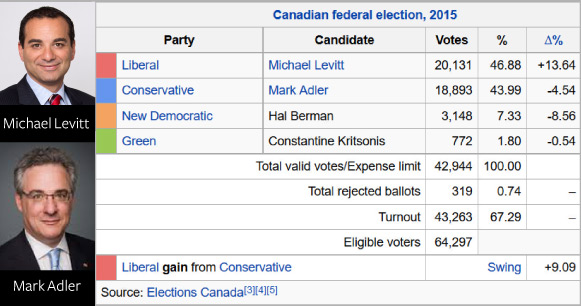 Incumbent Mark Adler (Bottom left) lost his seat in the last Federal election to first time candidate Michael Levitt (top Left). The election was close, as the incumbent received a healthy 44% of the vote, but still lost to Mr. Levitt at 47%.
Incumbent Mark Adler (Bottom left) lost his seat in the last Federal election to first time candidate Michael Levitt (top Left). The election was close, as the incumbent received a healthy 44% of the vote, but still lost to Mr. Levitt at 47%.



